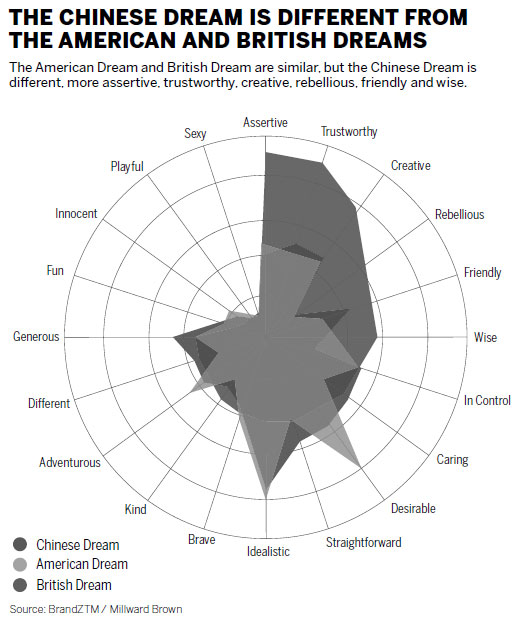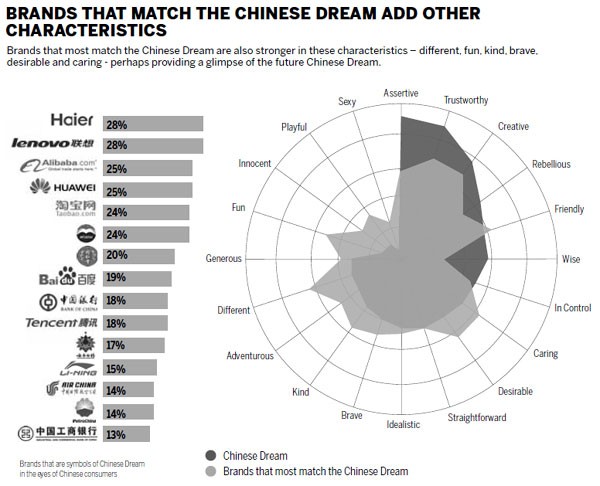

Creating strong brand identity from Chinese Dream poses greatest challenge but offers biggest potential payoff
If your brand is not creative, not even slightly rebellious, then it may not live up to the Chinese Dream, according to a major new survey.
These are the qualities - along with being assertive, trustworthy, wise and friendly - that most match Chinese President Xi Jinping's vision for the country's next decade.
The foreign brands that already fit into these categories include coffee chains Starbucks Corp and Costa Coffee as well as ice-cream maker Haagen Dazs and restaurant franchise Pizza Hut.
Samsung Group, whose Galaxy hand-held mobile devices are a hit among Chinese consumers, also makes the grade, along with French cosmetics brand The L'Oreal Group, US sportswear giant Nike Inc and the caffeine-fueled energy drink Red Bull,
The Chinese brands that most live up to the dream qualities include electrical goods maker Haier Group, computer and investment company Lenovo Group Ltd, e-commerce giant Alibaba Group and global telecommunications heavyweight Huawei Technologies Co Ltd.
The findings come from a survey - The Power and Potential of The Chinese Dream.
It was conducted by advertising and public relations giant WPP Plc, which looks at how both foreign and Chinese companies can align their brands to the new zeitgeist sweeping China.
Some 2,400 consumers were surveyed for the report, around 800 in China and the same number each in the US and the UK, so that international comparisons could be made.
The report suggests there are risks for brand owners who ignore the Chinese Dream since in at least three vital product categories - fashion, electronics and groceries - what it calls "phases of dreaming" (being inspired, having fun and learning something) are now ranked as more important for Chinese consumers than among those in either the United States or the United Kingdom.
These three "dreaming" phases are given a score of 204 out of 300 in China, compared with just 128 in the US and 122 in the UK.
Doreen Wang, deputy managing director of Millward Brown China, the global research consultancy arm of WPP, who worked on the report, says it is important for foreign companies operating in China to recognize the power of the Chinese Dream message.
"What we observed in our report is that international companies need to leverage the Chinese Dream and integrate it into their marketing strategies since it is one of the most important government messages that has been delivered recently.
"It will have a huge impact over the next decade and any business operating in China needs to be part of it."
According to the WPP report, companies operating in China have to be aware of meeting not just personal dreams of individuals but also aligning their brands with the national dream of becoming a wealthier and more powerful nation.
For 69 percent of the Chinese surveyed, their personal dream is interdependent with the national dream, whereas only 55 percent of American consumers say they are linked to the national dream.
Ben Cavender, an analyst at China Market Research Group in Shanghai, says a lot of brand strategists are actually trying to grasp the Chinese Dream concept.
"They are trying to understand it. This phrase is being tossed around, but everyone has got a slightly different take on what it means."
Cavender says that even if companies don't fully understand the concept, it should be picked up in their market research if it has any deep significance among Chinese consumers.
"Certainly companies operating in China are doing a lot more research and positioning and are having more dialogue with consumers," he says. "For a long time brands were just pushing what worked in other markets, but now they have moved away from that."
"Where the Chinese Dream concept may work best is with younger consumers. They are looking to improve their lives and are looking for new experiences, such as traveling more. Brands that can meet these expectations are likely to succeed."
Sherri He, a partner who specializes in consumer brands at international management consultants at AT Kearney in Shanghai, says foreign companies may adopt different strategies when it comes to the Chinese Dream between their public relations and advertising communications.
"With their public relations, when it comes to senior figures of companies giving interviews or their press releases, they may refer to the Chinese Dream. They are less likely to use the term in their advertising since I don't think it necessarily works with consumers, even though the messages behind it should," she says.
According to the survey, the Chinese associate having their own strong brands in international markets with national power. Some 67 percent said this was the case with only 25 percent being neutral on the issue and 8 percent disagreeing.
andrewmoody@chinadaily.com.cn
|
Li Min / China Daily |


(China Daily USA 05/26/2014 page15)